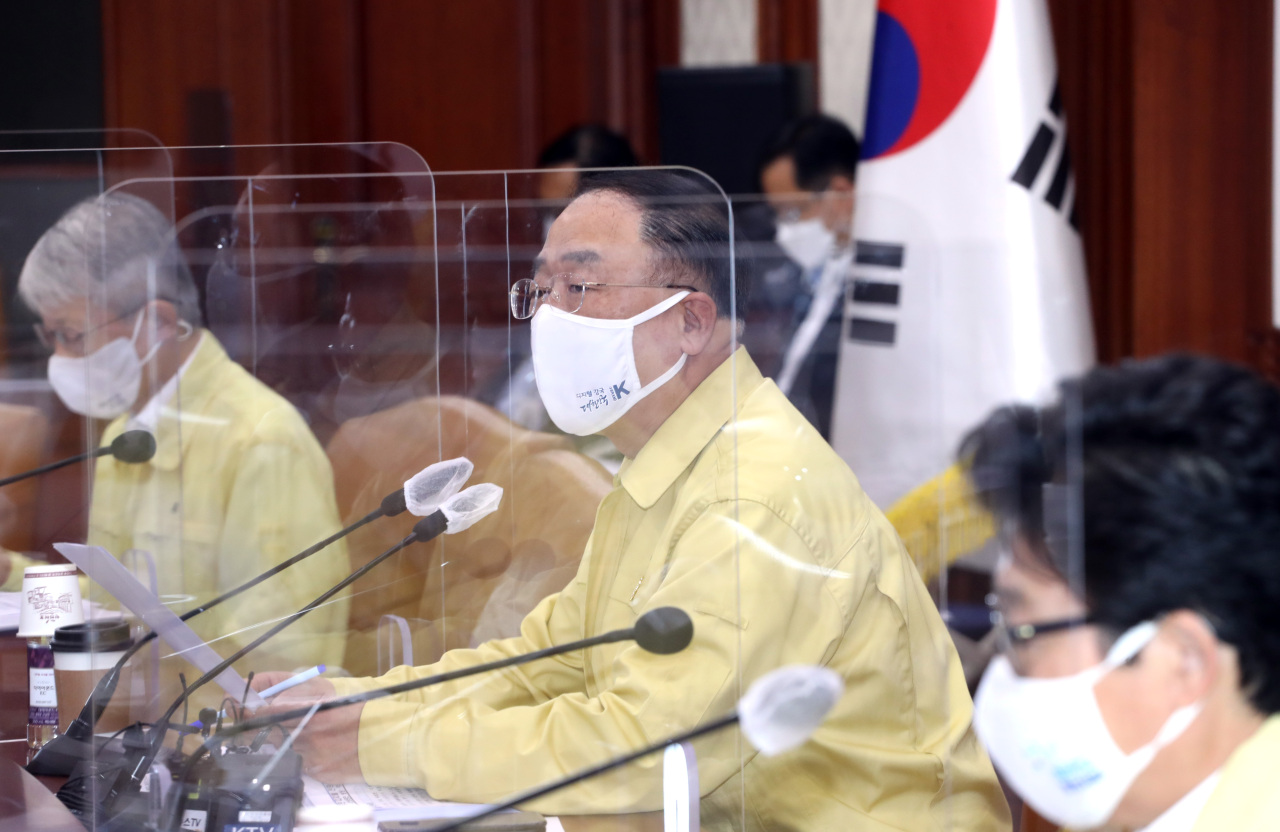Fiscal chief urges for extra budget approval by next Tuesday
Hong reiterates need for expansionary fiscal move amid COVID-19
By Bae HyunjungPublished : Sept. 17, 2020 - 17:00

South Korea’s fiscal chief on Thursday asked the National Assembly to approve the recently submitted fourth supplementary budget bill by early next week, aiming at handing out emergency relief funds ahead of the Chuseok holiday.
He also pledged to help small business owners digitalize their operations by providing online delivery systems to offline stores and traditional markets, in an extended effort to revamp the economy in the post-coronavirus era.
“Sept. 22 is the effective deadline (for the government) to execute the extra budget amount ahead of the Chuseok holiday,” said Deputy Prime Minister and Finance Minister Hong Nam-ki in a meeting of economy-related ministers held at Seoul Government Complex.
“We earnestly request that the National Assembly confirms the budget bill by then.”
The ruling Democratic Party and the main opposition People Power Party reached an agreement earlier this week to vote on the extra budget bill next Tuesday. The given day comes just in time for the Chuseok holiday that begins on Sept. 30.
Earlier this month, the government drew up an additional supplementary budget worth 7.8 trillion won ($6.6 billion), mainly seeking to help small merchants, self-employed people, and other economically fragile groups cushion the fallout of the recent epidemic resurgence.
The latest budget proposal, when approved, will add to the Korean government’s three past sets of extra budgets worth 60 trillion won combined.
Addressing small business operators, especially those in traditional markets, the finance minister said that the government will provide measures to speed up digitalized operations.
“(The government) will provide online delivery systems to 500 traditional markets by 2025 and help some 100,000 offline stores change into robot-based smart stores,” he said.
“We shall also kick off three pilot projects by 2022 to create new digital commercial districts.”
For the middle-aged and elderly age groups who are vulnerable to digital technology, the government will run an educational program, seeking to train some 50,000 people by 2025.
While recognizing the challenges lying ahead, the fiscal chief also complimented on the country’s relatively sound economic outlook and underlined the need of continued expansionary fiscal actions, citing the latest report by the Organization for Economic Cooperation and Development.
Is its Interim Economic Outlook report published on the previous day, the OECD predicted that the Korean economy in 2020 will contract 1 percent on-year. The adjusted figure marked a slight downgrade from the August forecast of 0.8 percent contraction but still was the higest growth estimate among member states.
“It is encouraging that (the OECD’s) policy recommendations largely came in line with the (Korean) government’s current policy directions,” Hong wrote on Facebook.
“The aim must be to avoid premature budgetary tightening when economies are still fragile. Premature withdrawal of fiscal support in 2021 would stifle growth, as occurred in the aftermath of the global financial crisis in many countries,” the Ministry of Economy and Finance said in a release, quoting the OECD report.
The OECD’s message came while Asia’s fourth-largest economy grappled with the snowballing level of sovereign debts to cover the emergency fiscal spending. With the fourth extra budget bill, the country’s deficit-covering bond total is expected to surpass 118 trillion won.
By Bae Hyun-jung (tellme@heraldcorp.com)

















![[KH Explains] Hyundai's full hybrid edge to pay off amid slow transition to pure EVs](http://res.heraldm.com/phpwas/restmb_idxmake.php?idx=652&simg=/content/image/2024/04/18/20240418050645_0.jpg&u=20240418181020)

![[Today’s K-pop] Zico drops snippet of collaboration with Jennie](http://res.heraldm.com/phpwas/restmb_idxmake.php?idx=642&simg=/content/image/2024/04/18/20240418050702_0.jpg&u=)